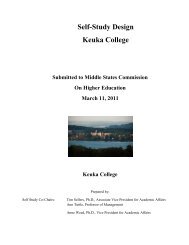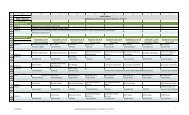final version of the self-study document - Keuka College's Middle ...
final version of the self-study document - Keuka College's Middle ...
final version of the self-study document - Keuka College's Middle ...
You also want an ePaper? Increase the reach of your titles
YUMPU automatically turns print PDFs into web optimized ePapers that Google loves.
In 2009, in response to <strong>the</strong> growth <strong>of</strong> non-traditional and international program areas, <strong>the</strong> Board<br />
<strong>of</strong> Trustees created <strong>the</strong> Committee on Alternative Ventures (CAV), later renamed Committee on<br />
Alternative Programs (CAP) to provide oversight to a growing segment <strong>of</strong> <strong>the</strong> College. This<br />
Committee’s responsibilities include reviewing proposals to <strong>of</strong>fer academic programs in<br />
alternative formats and/or locations from <strong>the</strong> traditional programs <strong>of</strong> <strong>the</strong> College and monitoring<br />
<strong>the</strong> enrollment and financial performance <strong>of</strong> <strong>the</strong>se programs. This committee has representatives<br />
from each <strong>of</strong> <strong>the</strong> standing committees <strong>of</strong> <strong>the</strong> board. The Vice President for Enrollment<br />
Management and International Programs is <strong>the</strong> primary liaison with <strong>the</strong> CAP. The committee<br />
meets monthly to review issues related to new program development, strategic planning, and<br />
fiscal performance. The CAP chair provides reports to <strong>the</strong> Board <strong>of</strong> Trustees at <strong>the</strong>ir regularly<br />
scheduled meetings. This committee allows <strong>the</strong> Board to focus greater attention and oversight on<br />
expanding non-traditional programs, and to better integrate Board review activities across <strong>the</strong><br />
many committees that now are affected by ASAP. In February 2011, <strong>the</strong> full Board approved a<br />
resolution which clarified <strong>the</strong> respective roles and responsibilities <strong>of</strong> <strong>the</strong> faculty, <strong>the</strong> Academic<br />
Affairs Committee <strong>of</strong> <strong>the</strong> Board, and <strong>the</strong> Committee on Alternative Programs with regard to<br />
proposals for new academic programs, new instructional sites and new program formats<br />
(Appendix 3.4 KC Board Approval Process for New Programs). The resolution was shared with<br />
<strong>the</strong> faculty Curriculum Committee and Graduate Program Committee and <strong>the</strong>ir feedback<br />
solicited.<br />
The Board’s structure facilitates governance <strong>of</strong> <strong>the</strong> College and includes <strong>the</strong> following<br />
committees:<br />
Executive Committee<br />
o Presidential Development Subcommittee<br />
o Executive Compensation Subcommittee<br />
Financial Affairs Committee<br />
o Investment Subcommittee<br />
o Buildings and Grounds Subcommittee<br />
Audit Committee<br />
Committee on Trustees<br />
Academic Affairs Committee<br />
Enrollment Management and Marketing Committee<br />
College Advancement Committee<br />
Student Affairs Committee<br />
Committee on Alternative Programs<br />
An administrative vice president is assigned to each committee, as appropriate to <strong>the</strong> nature <strong>of</strong><br />
<strong>the</strong> committee work, with <strong>the</strong> exceptions <strong>of</strong> <strong>the</strong> Executive Committee and Committee on<br />
Trustees. The Board committees exercise appropriate oversight and decision-making authority<br />
with regard to those responsibilities that are fiduciary or central to <strong>the</strong> College’s achievement <strong>of</strong><br />
its mission. For example, <strong>the</strong> Board’s fiduciary responsibility is overseen by <strong>the</strong> Financial<br />
Affairs and Audit Committee, whereas <strong>the</strong> Academic Affairs Committee assures <strong>the</strong> quality <strong>of</strong><br />
<strong>the</strong> College’s academic programs. At each Board meeting, <strong>the</strong> respective committees provide a<br />
report that addresses key initiatives, identifies challenges within <strong>the</strong>ir area <strong>of</strong> responsibility, and<br />
solicits input from <strong>the</strong> general Board.<br />
Page 4 <strong>of</strong> 19 Chapter 3: Leadership, Gov. & Admin.




